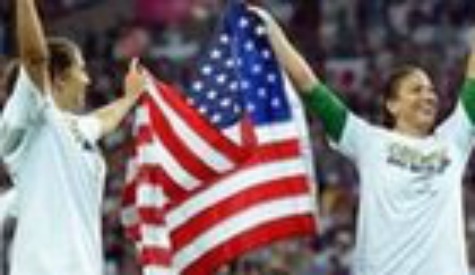 How has London 2012 changed the sporting map of the world?
How has London 2012 changed the sporting map of the world?
The United States won the highest number of gold medals and the most medals in total, with China dropping to second place on the medals table after unprecedented dominance at their home Olympics in Beijing four years ago.
Third place for Great Britain, exceeding all expectations and smashing a 2008 performance previously thought outstanding in its own right, had a knock-on effect for Russia as they fell out of the top three for the first time since the end of the Soviet era.
South Korea improved to fifth, their best finish since hosting the Games in Seoul 24 years ago, while Australia endured a comparatively miserable Olympics to take 10th place, their worst performance in two decades.
Here, BBC Sport breaks down how each nation won its medals, what the result might mean and how fans at home have reacted.
United States
This was the best-ever performance from a US team outside American soil, topped only by huge hauls of 78 golds at the St Louis 1904 Games and 83 at the boycotted Los Angeles Games of 1984.
Restoring the US to the top of the pile, and doing so comprehensively in terms of both Olympic titles and overall medals, had been the team's ambition and delighted their "immensely proud" Olympic committee chief executive Scott Blackmun.
Swimming was far and away the biggest asset to the US team, contributing 16 gold medals, nine more than its nearest rival, athletics. Of those 16, Missy Franklin and Michael Phelps were responsible for four each, a result that puts the pair of them above the entire Australian team.
Beyond their traditional dominance on the running track and in the pool, what impresses about the US performance at London 2012 is its breadth. The team won titles in 15 separate sports, unmatched by any other nation.
And the ultimate feel-good factor was sealed on the Games' final day as the US men ensured both basketball gold medals would head back across the pond.
China
The slip back into second place for China does not come as a surprise.
China's own officials were keen to play down expectations before the Games, not least because - shorn of the advantage of being the hosts - the team was several hundred athletes lighter than that fielded in Beijing four years ago. Funding had taken a similar dip.
When China won 51 gold medals at Beijing 2008, 38 of them came from only six sports: badminton, diving, gymnastics, shooting, table tennis and weightlifting. At London 2012, those sports supplied 27 golds - Chinese dominance still exists there, but not at the all-conquering level of their home Games.
In gymnastics, for example, China 'only' won five gold medals compared to 11 in Beijing, while there were shocks in some disciplines China had been expected to wrap up with ease. For example, Qiu Bo missing out on gold in the men's 10m platform diving.
Back in China, much has been made of perceived judging scandals and bias in the outcomes of some Olympic events, though little of this has filtered through into the Western press.
However, China does have one big success story from London 2012: swimming. Sixteen-year-old sensation Ye Shiwen and freestyle specialist Sun Yang, the nation's first-ever male Olympic champion in the pool, led the way as China picked up five swimming gold medals, making a dent in traditionally US-held territory for the first time.
Great Britain
You probably know this story by now. This is certainly the greatest Games for Britain in more than a century, and realistically the greatest-ever, given the only larger medal tally came in 1908, in London, when a third of all the competitors were British.
Against all the odds - rule changes, the loss of Britain-dominated events, reductions in riders per race - the GB track cycling team once again brushed aside all comers in the velodrome, winning seven gold medals and only failing to reach the podium in one of 10 events. That was the team sprint, where Victoria Pendleton and Jess Varnish were disqualified.
Rowing was the only other sport to bring in nine medals, four of them gold, while athletics contributed six medals (three of them gold in one all-star hour on the middle Saturday of the Games) and three sports added five: equestrian, boxing and sailing.
Gold medals came from 13 different sports as several made impressive breakthroughs, including canoe slalom, road cycling, triathlon and taekwondo.
Swimming, however, will be a concern and a review has already been launched after no Briton won a gold medal in the Aquatics Centre, with just one silver and two bronze medals to show.
Optimists may also conclude from London 2012 that the British team came within a whisker of at least five or six more Olympic titles. While nobody can seriously suggest a challenge for second place is on the cards, if funding levels are maintained and progress continues for the next four years, a successful defence of third place could be a realistic expectation.
Russia
Russia's slide out of the top three may have more to do with other nations improving rather than any failings of their own team.
In raw medal-winning terms, Russia's London 2012 performance marked an improvement on Beijing 2008, improving from 23 gold medals to 24 and up from a total of 73 medals to 82.
But, just as China's sporting prowess rocketed in the years building up to Beijing, pushing Russia back, so the British bounce on the back of host-nation status saw GB leapfrog Russia into third.
No gold medals in weightlifting, where five silvers were won, will have been hard for the Russian team to bear, though athletics remained as strong as ever, bringing home eight golds and 18 medals overall, even without the likes of Yelena Isinbayeva contributing gold as expected. Three Russians won gold in judo, famed as President Vladimir Putin's favourite sport.
"We have fallen behind the likes of China," admitted Alexander Zhukov, president of the Russian Olympic Committee. "But I can say that the state policy of supporting sports and children's sports very much resembles the old Soviet system we dominated.
"They have actually copied the Soviet system of children's training and so on. It is rather difficult for us to return to the Soviet system now and, besides, it is doubtful whether it is reasonable in this day and age."
South Korea
South Korea's Olympic performance has remained remarkably stable over the years, almost always registering around 30 medals in total, and what tends to determine their position in the medal table is more the fortunes of other nations.
This time, South Korea had 13 golds among their standard 30-or-so medals (28, to be exact), enough to edge them into fifth ahead of Germany and France, each of whom won more medals in total but only managed 11 golds each.
That gives the South Koreans their best-ever finish in an Olympic medal table with the exception of their home Seoul 1988 Olympics, where once again a haul of 30-ish medals and 12 gold got them into the top four. South Korea has invested substantially in elite sport in recent years, matching British funding levels in some instances.
Eleven gold medals, meanwhile, is Germany's worst performance at an Olympics since the Berlin Wall came down. The Germans sent a team bigger than that of China but won not a single medal in the pool, relying instead on canoe sprint, equestrian and rowing for most of their gold medals. The reception in Germany has been largely negative, with much debate about how the team could have been better prepared.
Australia
Woe is Australia. The twin themes of the London Olympic medal table have been British success and Australian struggle, which began in swimming and extended elsewhere as they finished 10th.
Sally Pearson, the 100m hurdler, delivered gold as expected having spent years being billed as the woman who could not fail to win, but then Australian swimming has had that reputation for decades yet not one individual gold went to an Aussie in the pool at London 2012. Ian Thorpe seemed embarrassed as he conceded: "In some ways our athletes have been unlucky, but this has been a disappointing Games."
Sailing came to Australia's rescue with three gold medals, but a final tally of seven titles - the worst since Barcelona 1992 - has already moved some Antipodean columnists to suggest a re-evaluation of Australia's place in the global sporting domain. As more nations inject the kind of funding and dedication into elite sport which was once an Australian trademark, can a country of its size keep up?
Brazil
What of the next Summer Olympic hosts? For a country of almost 200m people, Brazil punches well below its weight in elite summer sport, finishing 22nd in London.
The record for Brazil is five gold medals at Athens 2004, while just 12 years ago the Brazilian team came away from Sydney 2000 without a single gold for their troubles, placing as low as 53rd.
In London, Brazil picked up one gold medal in gymnastics, one in judo and one in volleyball, with football silver and a couple of medals in the pool being other highlights.
The very last medal to be won at London 2012, bronze in the women's modern pentathlon, went to Brazil's Yane Marques, which may yet prove a good omen ahead of Rio 2016. But for the hosts to make any impact on the medal table in four years' time, a lot will have to change.
By Ollie Williams
BBC Sport
Source: www.bbc.co.uk
 AS at 4 p.m. yesterday, Chief Secretary of the Tobago House of Assembly, Orville London, had not yet received an invitation to join in today's motorcade organised by several Government ministries to celebrate the achievements of local athletes who competed in the 2012 London Olympics.
AS at 4 p.m. yesterday, Chief Secretary of the Tobago House of Assembly, Orville London, had not yet received an invitation to join in today's motorcade organised by several Government ministries to celebrate the achievements of local athletes who competed in the 2012 London Olympics.

 Juliette John, a former athlete and relative of some of the young T&T cyclists, yesterday expressed frustration with what she regards as poor support for the athletes from the T&T Cycling Federation (TTCF).
Juliette John, a former athlete and relative of some of the young T&T cyclists, yesterday expressed frustration with what she regards as poor support for the athletes from the T&T Cycling Federation (TTCF).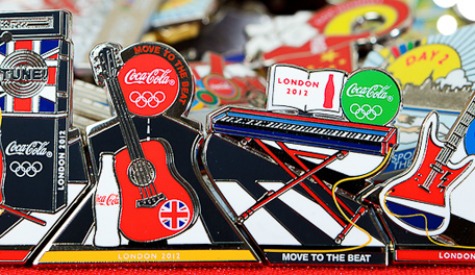 Coca-Cola, the Olympics longest-standing sponsor, was tonight forced to issue a grovelling apology after it deleted the birthplace of the Games, Greece, from a map displayed at the Olympic Park during London 2012.
Coca-Cola, the Olympics longest-standing sponsor, was tonight forced to issue a grovelling apology after it deleted the birthplace of the Games, Greece, from a map displayed at the Olympic Park during London 2012. 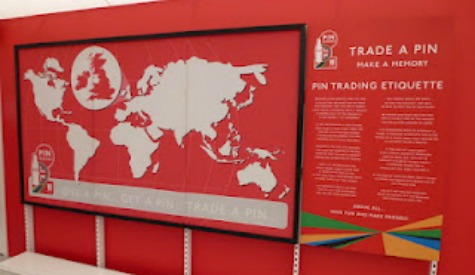 But it was the fact that it did not include Greece, the birthplace of the Olympics, which has proved the most controversial with insidethegames receiving several hundred comments today alone on the topic.
But it was the fact that it did not include Greece, the birthplace of the Olympics, which has proved the most controversial with insidethegames receiving several hundred comments today alone on the topic. "Coca-Cola has taken the matter very seriously and, once the situation was brought to our attention, as a matter of urgency, a new, more accurate design was put into production.
"Coca-Cola has taken the matter very seriously and, once the situation was brought to our attention, as a matter of urgency, a new, more accurate design was put into production. 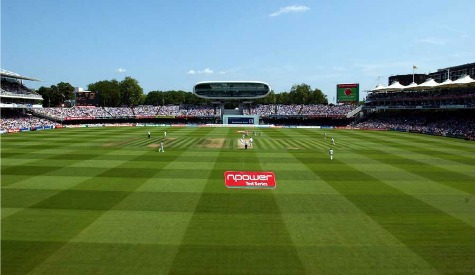 The Marylebone Cricket Club (MCC), the former governors of the sport, is launching a campaign to get cricket restored to the Olympic programme because they believe it would help it develop around the world.
The Marylebone Cricket Club (MCC), the former governors of the sport, is launching a campaign to get cricket restored to the Olympic programme because they believe it would help it develop around the world. 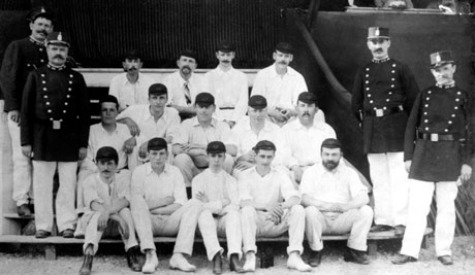 Rodney Miles, the former chairman of the Hong Kong Cricket Club (HKCC) who addressed the MCC on the topic at their meeting at Lord's believes the sport has a future in China if it can get into the Olympics.
Rodney Miles, the former chairman of the Hong Kong Cricket Club (HKCC) who addressed the MCC on the topic at their meeting at Lord's believes the sport has a future in China if it can get into the Olympics. How has London 2012 changed the sporting map of the world?
How has London 2012 changed the sporting map of the world? Meet the volunteers who helped to make the London 2012 Olympic Games a success.
Meet the volunteers who helped to make the London 2012 Olympic Games a success. Usain Bolt said he had “no respect” for Carl Lewis, the man whose Olympic feats he eclipsed with victory in the 200m, saying the American’s recent comments on doping were attention-seeking.
Usain Bolt said he had “no respect” for Carl Lewis, the man whose Olympic feats he eclipsed with victory in the 200m, saying the American’s recent comments on doping were attention-seeking.